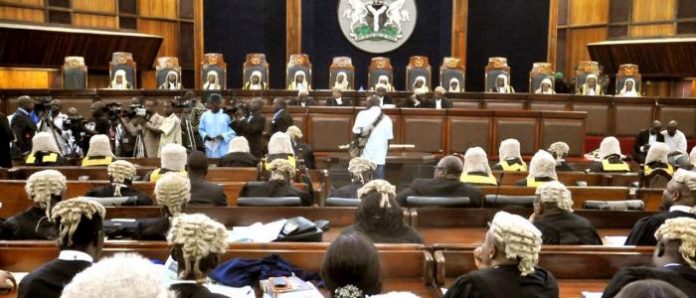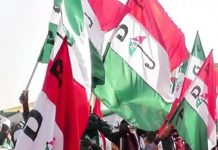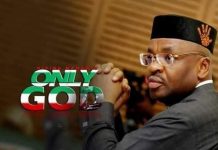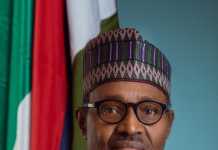
ABUJA—The Presidential Election Petition Tribunal sitting in Abuja, on Thursday, dismissed the petition the Hope Democratic Party, HDP, and its candidate, Chief Ambrose Owuru, filed to nullify the outcome of the February 23 presidential election and remove President Muhammadu Buhari from office.Buhari
HDP, in the petition marked CA/PEPC/001/2019, contended that the Independent National Electoral Commission, INEC, failed to follow condition precedents stipulated in the Electoral Act, when it unduly postponed the presidential election that was originally fixed for February 16.
The party claimed that its candidate, Owuru, secured over 50million votes in a referendum that was conducted by both electorates and observer networks that were dissatisfied with the unilateral postponement of the presidential election by INEC.
It therefore urged the tribunal to uphold the outcome of the referendum “the people” conducted on February 16, and invalidate the “substituted election” and “undue return” of President Buhari.
Meanwhile, in a unanimous judgement, the Justice Mohammed Garba-led five-member panel tribunal, dismissed the petition as an abuse of the Court.
Before it gave the final verdict, the tribunal, in line with paragraph 12(5) of the First Schedule to the Constitution and section 285(8) of the Constitution, delivered nine pending rulings in the matter.
In three of the rulings on motions that were filed by the respondents- President Buhari, INEC and the All Progressives Congress, APC- the tribunal, struck out the petition.
It upheld the preliminary objection President Buhari filed to challenge the competence of the petition he described as “highly vexatious, nebulous, generic, hypothetical and academic”.
The tribunal held that issues the petitioners raised before it were pre-election matters that it lacked the jurisdiction to entertain.
It held that none of the grounds of the petition fell under section 138(1) of the Electoral Act that involves the conduct of an election, noting that the case was “based merely on the supposed referendum”.
The tribunal held that pre-election matters are outside the original jurisdiction that was conferred on it by section 239(1) of the Constitution to entertain petitions regarding to election to the office of the President and the Vice President.
It equally upheld INEC’s objection to the petition, stressing that under section 132 (1) of the Constitution and section 25(5) of the Electoral Act, only the electoral body has the power to fix a date for the conduct of an election.
It held that section 26(1) of the Electoral Act equally empowered INEC to postpone the already fixed election date.
The tribunal held that the totality of evidence the petitioners adduced before it did not establish on a minimal scale, the alleged referendum.
“The petition filed by the petitioners in March 7 is hereby struck out for being incompetent”.
More so, the tribunal noted that the constitution was emphatic that pre-election matters must be filed within 14 days after the contested event occurred.
However, it refused a motion INEC filed for the petition to be dismissed on the premise that the Vice President, Prof. Yemi Osinbajo, SAN, was not joined as a party to the case.
INEC had argued that Osinbajo was a vital party since he shared a join ticket with Buhari and would be affected by the outcome of the petition.
In its decision, the tribunal said it was satisfied that Osinbajo was not a necessary party whose absence could affect the effective determination of issues that were raised in the petition.
“Joinder or non-joinder of the Vice President is not fatal to the petition as he is not a necessary party to the petition”, the tribunal held.
It declined to award cost against the petitioners as it was prayed to do by the respondents.
President Buhari had in a motion he filed on May 8, asked the tribunal to dismiss the petition in its entirety for constituting an abuse of the court process.
He argued that the petition was not filed in compliance with section 138 of the Electoral Act, insisting that the issue of a referendum was outside the span of jurisdiction of the the tribunal.
Buhari maintained that the petition was alien as it was not based on any law that is known to the Nigerian jurisprudence.
Besides, he contended that under sections 131, 132 and 134 of the Constitution clearly provided that the only way to remove a sitting President from office is through election and not a Referendum.
The petitioners had on July 22, closed their case after they called one witness, Mr. Yusuf Ibrahim, in his testimony, insisted that they defeated President Buhari at the referendum they said held on February 16.
HDP and its candidate equally tendered some documents that comprised of Certified True Copies of Newspaper publications, final list of presidential candidates INEC, released before the February 23 presidential poll, as well as a report of a referendum purportedly conducted by Citizens Observers Referendum/Election Right Protection of Nigeria.
All the documents were admitted into evidence and marked as Exhibits P1 to P10, though all the respondents challenged their admissibility, urging the tribunal not to accord them any probative value.
The witness had under cross-examination, debunked allegation that the said the referendum was spiritually conducted.
Admitting that though INEC was the body with statutory powers conduct and regulate election in Nigeria, he said the referendum held for “people’s voice to be heard.
Asked if the referendum was celestial or something that happened in the spiritual realm, the witness said: “It was a physical one and not spiritual.”
He said it was neither done over the internet nor through INEC’s server.
Ibrahim said his party and its candidate were not seeking to be declared winners based on the outcome of the February 23 presidential Poll, but on the strength of the referendum.
None of the respondents produced a witness before the tribunal.
The tribunal had initially rejected a motion the petitioners filed to sack Buhari and declare their candidate, Owuru as President.
In the motion dated June 17, the petitioners gave reasons why the tribunal should invoke its powers and order the Chief Justice of Nigeria, Justice Tanko Muhammad, to within 48 hours, swear Owuru in to replace Buhari based on the outcome of the referendum.
They maintained that the referendum took place after INEC, upon realising that President Buhari would be defeated at the poll, abruptly postponed the election date.
In the application titled “Notice Of Intention To Contend”, Owuru, aside seeking to be sworn-in as President, prayed the tribunal to nullify the outcome of the February 23 presidential election on the premise that it held in substantial non compliance with the Electoral Act.
The tribunal however dismissed the application it described as “alien and extraneous” to all the laws in Nigeria.
Kindly contact us @ Naijalivetv@gmail.com
Call or Whatsapp: 07035262029, 07016666694, 08129340000










